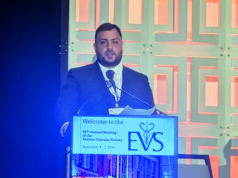
Vascular surgery is as important as anesthesia in providing a safe operating room (OR), Richard Powell, MD, the vascular section chief at Dartmouth-Hitchcock Medical Center in Lebanon, New Hampshire, told an Eastern Vascular Society (EVS) annual meeting (Sept. 23–26) issues panel exploring how to demonstrate the value of the specialty to hospital administrators.
But the vascular surgical contribution to the wider healthcare system is not without costs, Powell’s presentation demonstrated: Indexed to family medicine doctors, vascular surgeons worked more hours than any other specialty in an analysis of annual physician work hours performed by 41 specialties and four broad specialty categories. He was quoting a study by J. Paul Leigh, PhD, et al published in JAMA Internal Medicine in 2011 that found those practicing the vascular specialty logged a mean of 888 more hours per year than those in family practice.
The difference between vascular surgery and the nearest competitor—critical care internal medicine—was about 200 hours, he noted. Top, “and not by a little bit,” said Powell, who earlier this year led a research team that published “The value of the modern vascular surgeon to the healthcare system: A report from the Society for Vascular Surgery Valuation Work Group” in the Journal of Vascular Surgery.
“Some might say, ‘We’re first, that’s great,'” he remarked ironically before the EVS meeting in Charleston, South Carolina, “but for quality of life, and for attracting people into our specialty, we have to really think about how we do things.”
Powell pointed to a string of data showing “vascular surgery is an enabling service that broadens the scope of the types of procedures a healthcare system can offer.” Many hospital administrators see vascular surgery through the prism of the elective surgery revenue it generates—the “tip of the iceberg,” he said.
“What they may not see or appreciate is the role of vascular surgery in making a safe OR environment, the case mix index that we have—the measure of case complexity in which our patients are quite high—that has a good impact on revenue for the hospital, and how we support other services,” Powell continued. One study that looked at off-service cases performed by vascular surgeons essentially showed that “basically every specialty will need vascular surgery help in the operating room.”
Powell described the now common refrain of vascular surgeons as the firemen of the OR as he referenced the type of procedures requiring vascular assistance—some that would likely result in patient death with no vascular surgeon presence. “The take home message here is vascular surgery is as important as anesthesia in providing a safe operating room,” he said.
“There are different types of assistance we provide besides our direct contribution margin for the vascular service line,” Powell explained. “We provide indirect help, off-service help for non-vascular surgery services. These emergent cases can disrupt the elective OR schedule and our clinics. There are many cases that don’t require vascular reconstruction: You help a cancer surgeon pull a tumor off the iliac artery, you haven’t really done anything to the iliac. So there is not much of a CPT code for that.”
Powell pointed to a more elusive vascular contribution to the wider healthcare system: the “hey, I-probably-won’t-need-you-but-will-you-be-around consult,” he calls it. “How do you value that?” he said.
“We don’t typically work like the acute care surgeons in a shift work model. Vascular practices need to maintain a full clinic and a full elective surgery schedule, and emergencies disrupt the clinic, resulting in angry dissatisfied patients. We postpone our electives until the evening in order to take care of the emergencies.”
Which recalls the kind of data showing that vascular surgeons work more hours than any other specialty contrasted against family medicine. “This has a significant impact on the quality of life for vascular surgeons,” Powell remarked.
“Hospital administration may lack an appreciation for the scope of vascular surgery, but in particular for the indirect service revenue, for the co-surgeries we do, our impact on patient safety, and the disruptive nature of these vascular emergencies,” he said. “They don’t have a good handle on the scope of what we provide to the healthcare system, and they don’t have inherent expertise in developing cardiovascular service lines so they frequently use outside consultants to do their strategy development. We do suffer from a branding crisis so i think the key audiences are the C-suite and cardiovascular consulting services. We need to get involved with hospital leadership, something that we have not done as well as other specialties.”












